Italy will be led by a right-wing coalition. In an election with a very low electoral turn-out (64 percent, a 10 percent drop from previous elections), the party led by Giorgia Meloni, Fratelli d'Italia (FdI) racked up the vote by placing first with 26 percent of the vote. It also overcame allies the Lega (steady at 9 percent) and Forza Italia (around 8 percent), and is set to form a government in one of the most complex transitions in the history of the republic and the European Union in general, amid the economic slowdown, war in Ukraine and climate crisis.
Right-wingers facing environmental challenges
Giorgia Meloni, who has excellent relations with the French right wing of Marine Le Pen and the ultraconservative and authoritarian Hungarian and Polish governments, has no history of thinking and acting about the environment and energy. She has often leaned on populist positions, from her no to electric cars to warnings about the economic impacts on industry sectors doomed by the ecological transition (from the combustion engine world to beach resorts, from small construction to agriculture and animal husbandry). An opposition that is often ideological and never immersed in the realism that those who govern and do not just shriek from the opposition benches must have.
As the M5S, which for years has had one of the most environmentalist programs on paper in Italy's political offerings, has also shown, at the time of running public affairs, between economic interests, citizen pressure, and opposition from committees and lobbyists, it is very difficult to do your own thing, especially at a time when the energy issue is the key to the two main international crises mentioned above: climate and the Russian-Ukrainian conflict.
One of the most well-reasoned analyses of this election campaign, on the parties' climate commitment, carried out among experts and scientists by Italian Climate Network and Climalteranti scored Fratelli d'Italia and the rest of the coalition very poorly: 4.1 out of 10, a clear failure. Very bad on climate justice; 1.7 on commitment to move away from fossil fuels; 2.7 on ambition of decarbonization policies; 3.6 in Public Investment. Slightly better only on the international framework, on which the coalition still remains far below a passing grade (4.5).
On the one hand, the newly elected parliamentarians of the right, which will be over 220, will find themselves with a series of bills that have been put off for years: from the water bill to the long-awaited one on land use, not to mention the role of the ecological transition in the budget law, from the strengthening of the ecobonus to support for renewables, and finally all the reform work put into the NRRP program. If when it comes to water, Meloni's right wing could set aside the private interests of the Lega and Forza Italia and with populist panache could pass a law on water as a national-popular good (they will never use the word common), much more difficult will be the possibility of making a law on land use, which is frowned upon by thousands of voters and constituents working in the construction sector.
With the arrival of the international agreement on biodiversity that calls for countries to protect at least 30 percent of their national territory for species protection, FdI will find itself in a quandary, squeezed by the interests of the many small agricultural, seaside, livestock, and fishing businesses and its own ideological need to give maximum prominence to an issue that the Right must make its own in its conception of environmentalism, namely conservation. The former is presumed to prevail, but there could be surprises, especially coming from younger parliamentarians.
The executive game: who will head to the Ministry of Ecological Transition?
On the other side is the immense executive game, caught in the nightmare of the NRRP even before the government is formed (so much so that Draghi and numerous technicians are already being called upon for the most complex dossiers). While it seems possible that Gian Marco Centinaio (Lega) will be back to wreak havoc in Agriculture (but the dicastery could be taken by someone from the FdI), a technician such as Fabio Panetta, another ECB man like Draghi, is expected at the Economy, who will have to manage the complex situation of energy price increases, inflation and the NRRP.
Numerous rumors are circulating about the Ministry of Ecological Transition (MITE). The Lega would have liked to reappoint Minister Roberto Cingolani, beloved by Giancarlo Giorgetti for his pro-nuclear and pro-gas stances, who was nominated in the first instance by the M5S (which, by the way, elects former environment minister, the always popular Sergio Costa, to parliament in Naples). But with the Lega at 9 percent, they will have to be content with expressing Giorgetti himself at the Ministry of Economic Development, given the crushing defeat received by Salvini, who is heading into the sunset inside the once-autonomist formation. MITE will hardly be entrusted to a politician given the complexity of the dossiers to be handled (NRRP implementation; ecological transition and climate plan, adaptation, renewables, gas prices, COP27 climate and COP15 biodiversity negotiations coming up in November and December).
One name insistently circulated is that of Francesco Starace, CEO and General Manager of Enel, who makes the world of renewables and the green economy dream: a name well known abroad and who would certainly give great guarantees about the new government's intentions on energy and also climate (Starace is successfully leading a giant like Enel toward decarbonization and electrification). Another big name is Stefano Donnarumma, Terna's CEO, always highly qualified on the energy side (perhaps less so on environmental dossiers), who would find himself in a Ministry to be reorganized after Cingolani's chaotic management and to be reformed also in terms of internal competencies.
The skills to run this ministry, established only in February 2021 from the ashes of the Ministry of the Environment and the energy directorates of the Ministry of Economic Development, are not lacking in either Donnarumma or Starace. Cingolani had declared last December that he would step down in the spring, then the mess broke out, and to ensure continuity he may be the solution of convenience, but certainly not the right one, given his neglect of any sector except energy where he cannot be said to have taken progressive and environmentalist positions.
For the time being, all that remains is to wish all elected MPs and senators well. The climate-negationist and anti-environmentalist positions of Orban, Trump and Le Pen must find no place in this parliament or in the government to be approved by Mattarella and proposed by Giorgia Meloni. The stakes are highest and the imperative is to win, proving that the environment and energy are indeed a super-partisan issue. Since defeat would be paid for by anyone, with no difference between abstainers, progressives, conservatives, post-fascists or post-communists.
Image: Shutterstock



